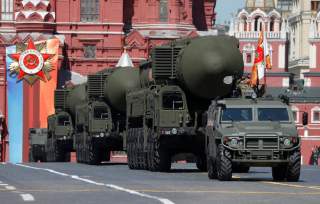Could a U.S.-Russian Deployment Ban Avoid a Nuclear Arms Race in Europe?
Having pulled the plug on the Intermediate Nuclear Forces Treaty, President Donald Trump now faces two fraught choices.
If Russia refuses, then at least the United States will be seen to have tried, and President Putin will have been nakedly revealed as determined to preserve and expand a nuclear arsenal aimed squarely at NATO countries. This outcome would leave us no worse off than we are today, but with the benefit of providing clarity to European public and American public about who is at fault and what is at stake. If on the other hand Russia accepts, then NATO must remain vigilant against a sudden Russian redeployment, and plan for contingency countermeasures. At the same time, even this worst-case scenario would still leave us better off than today. Whereas Russia could easily roll its missiles back across the Urals, it would have new legal, political, and geographic hurdles to clear. This adds a small but useful buffer of strategic warning relative to what exists now because redeployment would constitute a readily detectable and indisputable treaty violation that would take some days or even weeks to accomplish.
NATO should welcome this outcome, but what about other countries? China would be unhappy. But is this a bad thing? Especially if it incentivizes Beijing to reconsider its unyielding refusal to even discuss arms control? In any case, the situation for China would be little different than what it now faces with the demise of the INF Treaty. As for Japan and other U.S. friends and allies in Asia, there might be some trepidation about shifting nuclear competition from Europe to Asia. But this shift is happening already, and unlike during the Cold War, it is China, rather than Russia, that now represents the overriding concern for these countries. In some ways, it could even be beneficial, since a portion of China’s IRMs would need to be aimed at Russian systems rather than at them. As for the rest of the world that is now watching from the sidelines as the U.S.-Russian disarmament edifice crumbles? Many countries will express dismay that a limited deployment ban falls far short of the deep further disarmament they are seeking. Yet most would concede that even a modest measure of restraint is better than a freewheeling nuclear arms race in Europe.
In sum, a deployment ban represents a pragmatic compromise between INF Treaty and nothing. It would not remedy the emergence of broader nuclear competition among the jockeying great powers, but it could at least take the hardest edges off the demise of the INF Treaty. More importantly, there is little downside. If Russia agrees, then this is a modest step in the right direction. If Russia declines, then at least America and its allies know where things stand, and where the fault lies. Either way, it is worth a try.
Dr. David A. Cooper is the James V. Forrestal Professor of National Security Affairs at the U.S. Naval War College. He previously served for many years as a career Pentagon official including as Director of Strategic Arms Control Policy overseeing implementation of the INF Treaty. He is currently at work on a book about adapting the U.S. approach to arms control for a new era of nuclear completion. All views expressed are solely his own.
Image: Reuters

